The Cynical and Dangerous Weaponization of the "White Supremacist" Label
The Cynical and Dangerous Weaponization of the "White Supremacist" Label
In dominant elite discourse, no evidence is needed to brand someone a "white supremacist." The belief that it will produce political or personal gain suffices.
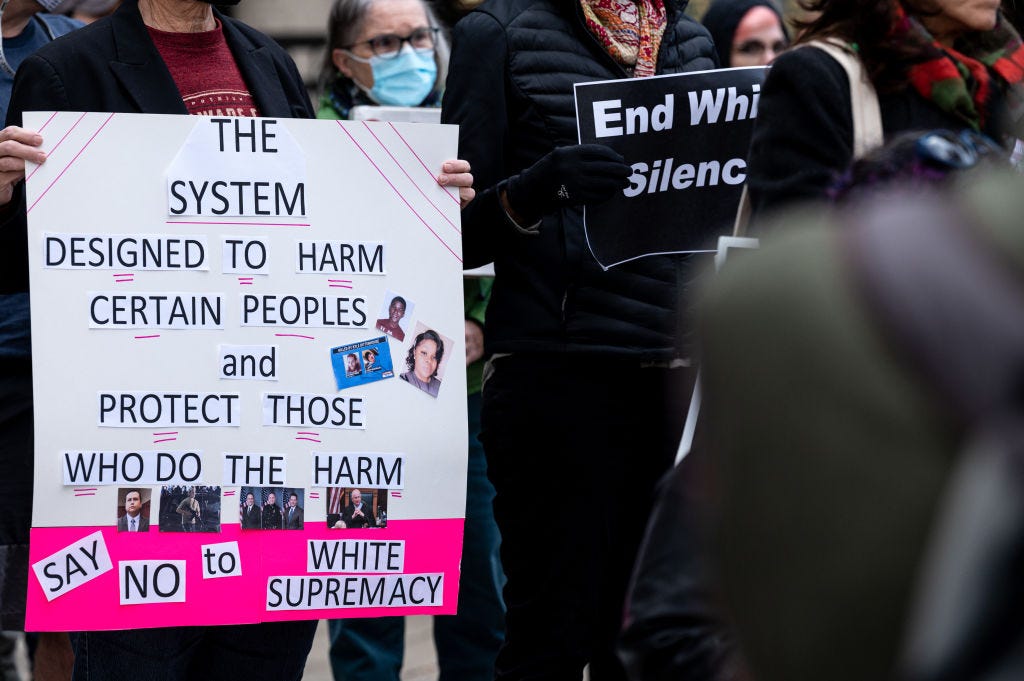
Within hours of the August 25, 2020, shootings in Kenosha, Wisconsin — not days, but hours — it was decreed as unquestioned fact in mainstream political and media circles that the shooter, Kyle Rittenhouse, was a "white supremacist.” Over the next fifteen months, up to and including his acquittal by a jury of his peers on all charges, this label was applied to him more times than one can count by corporate media outlets as though it were proven fact. Indeed, that Rittenhouse was a "white supremacist” was deemed so unquestionably true that questioning it was cast as evidence of one's own racist inclinations (defending a white supremacist).
Yet all along, there was never any substantial evidence, let alone convincing proof, that it was true. This fact is, or at least should be, an extraordinary, even scandalous, event: a 17-year-old was widely vilified as being a white supremacist by a union of national media and major politicians despite there being no evidence to support the accusation. Yet it took his acquittal by a jury who heard all the evidence and testimony for parts of the corporate press to finally summon the courage to point out that what had been Gospel about Rittenhouse for the last fifteen months was, in fact, utterly baseless.
A Washington Post news article was published late last week that was designed to chide "both sides” for exploiting the Rittenhouse case for their own purposes while failing to adhere carefully to actual facts. Ever since the shootings in Kenosha, they lamented, "Kyle Rittenhouse has been a human canvas onto which the nation’s political divisions were mapped.” In attempting to set the record straight, the Post article contained this amazing admission:
As conservatives coalesced around the idea of Rittenhouse as a blameless defender of law and order, many on the left just as quickly cast him as the embodiment of the far-right threat. Despite a lack of evidence, hundreds of social media posts immediately pinned Rittenhouse with extremist labels: white supremacist, self-styled militia member, a “boogaloo boy” seeking violent revolution, or part of the misogynistic “incel” movement.
“On the left he’s become a symbol of white supremacy that isn’t being held accountable in the United States today,” said Becca Lewis, a researcher of far-right movements and a doctoral candidate at Stanford University. “You see him getting conflated with a lot of the police officers who’ve shot unarmed Black men and with Trump himself and all these other things. On both sides, he’s become a symbol much bigger than himself.”
Soon after the shootings, then-candidate Joe Biden told CNN’s Anderson Cooper that Rittenhouse was allegedly part of a militia group in Illinois. In the next sentence, Biden segued to criticism of Trump and hate groups: “Have you ever heard this president say one negative thing about white supremacists?
Valuable though this rather belated admission is, there were two grand ironies about this passage. The first is that The Post itself was one of the newspapers which published multiple articles and columns applying this evidence-free "white supremacist" label to Rittenhouse. Indeed, four days after this admission by The Post's newsroom, their opinion editors published an op-ed by Robert Jones that flatly asserted the very same accusation which The Post itself says is bereft of evidence: “Despite his boyish white frat boy appearance, there was plenty of evidence of Rittenhouse’s deeper white supremacist orientation.” In other words, Post editors approved publication of grave accusations which, just four days earlier, their own newsroom explicitly stated lacked evidence.
The second irony is that while the Post article lamented everyone else's carelessness with the facts of this case, the publication itself — while purporting to fact-check the rest of the world — affirmed one of the most common falsehoods: namely, that Rittenhouse carried a gun across state lines. The article thus now carries this correction at the top: “An earlier version of this story incorrectly stated that Kyle Rittenhouse brought his AR-15 across state lines. He has testified that he picked up the weapon from a friend’s house in Wisconsin. This article has been corrected.”
It continues to be staggering how media outlets which purport to explain the Rittenhouse case get caught over and over spreading utter falsehoods about the most basic facts of the case, proving they did not watch the trial or learn much about what happened beyond what they heard in passing from like-minded liberals on Twitter. There is simply no way to have paid close attention to this case, let alone have watched the trial, and believe that he carried a gun across state lines, yet this false assertion made it past numerous Post reporters, editors and fact-checkers purporting to "correct the record” about this case. Yet again, we find that the same news outlets which love to accuse others of “disinformation” — and want the internet censored in the name of stopping it — frequently pontificate on topics about which they know nothing, without the slightest concern for whether or not it is true.
Those who continue to condemn Rittenhouse as a white supremacist — including the author of The Post op-ed published four days after the paper concluded the accusation was baseless — typically point to his appearance at a bar in January, 2021, for a photo alongside members of the Proud Boys in which he was photographed making the “okay” sign gesture. That once-common gesture, according to USA Today, “has become a symbol used by white supremacists.” Rittenhouse insists that the appearance was arranged by his right-wing attorneys Lin Wood and John Pierce — whom he quickly fired and accused of exploiting him for fund-raising purposes — and that he had no idea that the people with whom he was posting for a photo were Proud Boys members ("I thought they were just a bunch of, like, construction dudes based on how they looked”), nor had he ever heard that the “OK” sign was a symbol of "white power.”
Rittenhouse's denial about this once-benign gesture seems shocking to people who spend all their days drowning in highly politicized Twitter discourse — where such a claim is treated as common knowledge — but is completely believable for the vast majority of Americans who do not. In fact, the whole point of the adolescent 4chan hoax was to convert one of the most common and benign gestures into a symbol of white power so that anyone making it would be suspect. As The New York Times recounted, the gesture has long been “used for several purposes in sign languages, and in yoga as a symbol to demonstrate inner perfection. It figures in an innocuous made-you-look game. Most of all, it has been commonly used for generations to signal 'O.K.,’ or all is well.”
But whatever one chooses to believe about that episode is irrelevant to whether these immediate declarations of Rittenhouse's "white supremacy” were valid. That bar appearance took place in January, 2021 — five months after the Kenosha shootings. Yet Rittenhouse was instantly declared to be a "white supremacist” — and by “instantly,” I mean: within hours of the shooting. “A 17 year old white supremacist domestic terrorist drove across state lines, armed with an AR 15,” was how Rep. Ayanna Pressley (D-MA) described Rittenhouse the next day in a mega-viral tweet; her tweet consecrated not only this "white supremacist” accusation which persisted for months, but also affirmed the falsehood that he crossed state lines with an AR-15. It does not require an advanced degree in physics to understand that his posing for a photo in that bar with Proud Boys members, flashing the OK sign, five months later in January, 2020, could not serve as a rational evidentiary basis for Rep. Pressley's accusation the day after the shootings that he was a "white supremacist,” nor could it serve as the justification for five consecutive months of national media outlets accusing him of the same. Unless his accusers had the power to see into the future, they branded him a white supremacist with no basis whatsoever — or, as The Post put it this week, “despite a lack of evidence.”

The only other “evidence” ever cited to support the rather grave accusation that this 17-year-old is a "white supremacist” were social media postings of his in which he expressed positive sentiments toward the police and then-President Trump, including with the phrase "Blue Lives Matter." That was all that existed — the entirety of the case — that led the most powerful media outlets and politicians to stamp on this adolescent's forehead the gravest accusation one can face in American culture. This is really the heart of the matter: this episode vividly demonstrates how cheapened and emptied and cynically wielded this "white supremacist" slogan has become. The oft-implicit but sometimes-explicit premise in liberal discourse is that everyone who deviates in any way from liberal dogma is a white supremacist by definition.
Within this rubric, perhaps the most decisive "evidence" that one is a white supremacist is that one supports the Republican Party and former President Trump — i.e., that half of the voting electorate in the U.S. at least are white supremacists. A subsidiary assumption is that anyone who views the police as a necessary, positive force in U.S. society is inherently guilty of racism (it is fine to revere federal policing agencies such as the FBI and other federal security forces such as the CIA, as most Democrats do; the hallmark of a white supremacist is someone who believes that the local police — the ones who show up when citizens call 911 — is a generally positive rather than negative force in society).
An illustration of how casually and recklessly this accusation is tossed around occurred last year, shortly after the George Floyd killing, when my long-time friend and colleague, Intercept journalist Lee Fang, was widely vilified as a racist and white supremacist, first by his own Intercept colleague, journalist Akela Lacy, and then — in one of the most stunningly mindless acts of herd behavior — by literally hundreds if not thousands of members of the national press, including many who barely knew who Lee was but nonetheless were content to echo the accusation (that Lee is himself not white is, of course, not an impediment, not even a speed bump, on the road to castigating him as a modern-day KKK adherent). As Matt Taibbi wrote in disgust about this shameful media episode:
[Lacy's accustory] tweet received tens of thousands of likes and responses along the lines of, “Lee Fang has been like this for years, but the current moment only makes his anti-Blackness more glaring,” and “Lee Fang spouting racist bullshit it must be a day ending in day.” A significant number of Fang’s co-workers, nearly all white, as well as reporters from other major news organizations like the New York Times and MSNBC and political activists (one former Elizabeth Warren staffer tweeted, “Get him!”), issued likes and messages of support for the notion that Fang was a racist.
Writing in New York Magazine, Jonathan Chait documented that “Lacy called him racist in a pair of tweets, the first of which alone received more than 30,000 likes and 5,000 retweets.”
What was the evidence justifying Lee Fang's conviction by mob justice of these charges? He (like Rittenhouse) has expressed the view that police, despite needing reforms, are largely a positive presence in protecting innocent people from violent crime; he suggested violence harms rather than helps social justice causes; and he published a video interview he conducted of a young BLM supporter complaining that many liberals only care when white police officers kill black people but not when black people in his neighborhood are killed by anyone who is not white.
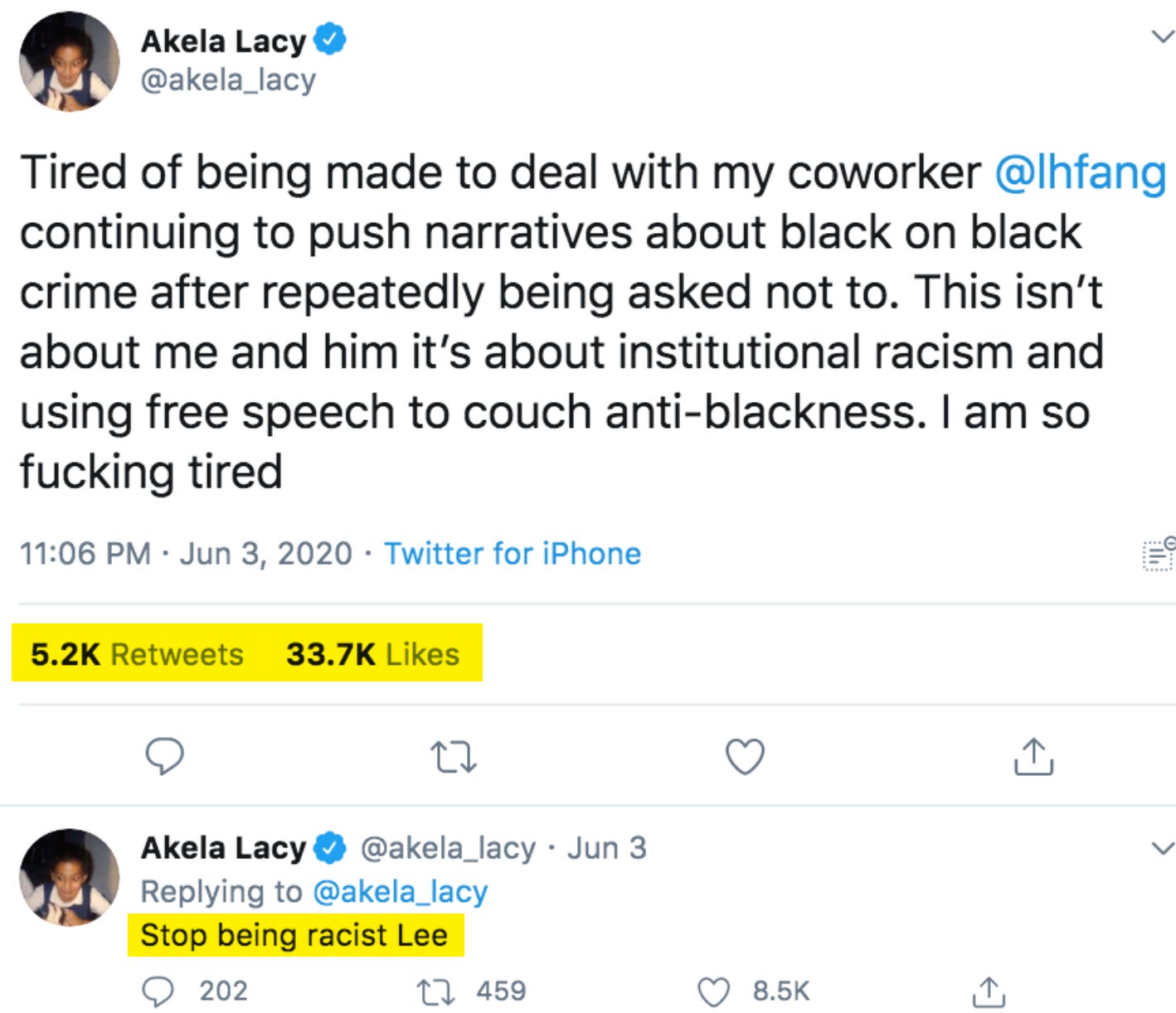
That such banal and commonly held views are woefully insufficient to justify the reputation-destroying accusation that someone is a white supremacist should be too self-evident to require any explanation. But in case such an explanation is required, consider that polls continually and reliably show that the pro-police sentiments of the type that caused Rittenhouse, Fang, and so many others to be vilified by liberal elites as "white supremacists” are held not only by a majority of Americans, but by a majority of black and brown Americans, the very people on whose behalf these elite accusers purport to speak.
For years, polling data has shown that the communities which want at least the same level of policing if not more are communities composed primarily of Black, Brown and poor people. It is not hard to understand why. If the police are defunded or radically reduced, rich people will simply hire private security (even more than they already employ for their homes, neighborhoods and persons), and any resulting crime increases will fall most heavily on poorer communities. Thus, polling data reliably shows that it is these communities that want either the same level of policing or more — the exact view which, if you express, will result in guardians of elite liberal discourse declaring you to be a "white supremacist.” Indeed — according to one Gallup poll taken in the wake of the George Floyd killing, when anti-police sentiment was at its peak — the groups that most want a greater police presence in their communities are Black and Latino citizens:
In the wake of anger over the Floyd and Jacob Blake cases, several large liberal cities succeeded in placing referendums on the ballot for this year that proposed major defunding or restructuring of local police. They failed in almost all cases, including ones with large Black populations such as Minneapolis, where Floyd died, precisely because non-white voters rejected it. In other words, expressing the same views about policing that large numbers of Black residents hold somehow subjects one to accusations of "white supremacy” in the dominant elite liberal discourse.
What all of this demonstrates is that insult terms like "white supremacist” and "racist” and "white nationalist” have lost any fixed meaning. They are instead being trivialized and degraded into little more than discourse toys to be tossed around for fun and reputation-destruction by liberals, who believe they have ascended to a place of such elevated racial enlightenment that they are now the sole and exclusive owners of these terms and thus free to hurl them in whatever manner they please. It is not an overstatement to observe that in elite liberal discourse, there are literally no evidentiary requirements that must be fulfilled before one is free to malign political adversaries with those accusatory terms. That is why editors at The Washington Post published an op-ed proclaiming Rittenhouse was plagued by “deeper white supremacist orientation” just four days after its news division explicitly concluded that such an accusation "lacks evidence” — because it it permissible to accuse people of racism and white supremacy without any evidence needed.
It is inherently disturbing and destructive any time a person is publicly branded as something for which there is no evidence. That is intrinsically something we should collectively abhor. But this growing trend in liberal discourse is not just ethically repellent but dangerous. By so flagrantly cheapening and exploiting the "white supremacist” accusation from what it should be (a potent weapon deployed to stigmatize and ostracize actual racists) into something far more tawdry (a plaything used by Democrats to demean and destroy their enemies whenever the mood strikes), its cynical abusers are draining the term of all of its vibrancy, potency and force, so that when it is needed, for actual racists, people will have tuned it out, knowing that is used deceitfully, recklessly and for cheap entertainment.
A similar dynamic emerged with accusations of anti-semitism and the weaponization of it to demonize criticisms of Israel. It is, of course, true that some criticisms of the Israeli government are partially grounded or even largely motivated by anti-semitism — just as it is true that some championing of the local police or support for Trump grows out of racist sentiments. But the converse is just as true: one can vehemently criticize the actions of the Israeli government the same as any other government without being driven by an iota of anti-semitism (indeed, many of the most vocal critics of Israel are proudly Jewish), in exactly the same way as one can be highly supportive of the local police or Donald Trump without an iota of racism (a proposition that should need no proof, but is nonetheless highlighted by the uncomfortable fact that growing number of non-whites supporting both Trump and the police). But the cynical, manipulative weaponization of anti-semitism accusations to smear all critics of Israel has rendered the accusation far weaker and more easily dismissible than it once was — exactly as is now happening to the accusatory terms "white supremacist” and “white nationalist” and "racist,” which are being increasingly understood, validly so, not as a grave and sincere condemnation but a cheap tactic to be applied recklessly, for the tawdry entertainment one derives from public rituals of reputation-destruction.
Ever since his acquittal, Rittenhouse has made a series of public statements directly at odds with the dark, hateful image constructed of him by the national press over the last sixteen months, while he was forced to remain silent by the charges he faced. He has professed support for the Black Lives Matter movement, argued that the U.S. is plagued by structural racism, and suggested that he would have suffered a worse fate if he had been Black. The same people who are smugly certain that his entire character and soul was permanently captured by that fleeting moment in a bar when he was seventeen and flashed an “okay" symbol — and who are certain that his denials that he knew what it meant or with whom he was posing are false — have, of course, scoffed at these recent statements of his as self-serving and insincere, even though they offer far greater insight into Rittenhouse's actual views on questions of race than anything thus far presented.
But that is the point. The political and media faction that casually and recklessly brands people as "white supremacists” the way normal people utter “excuse me” while navigating a large crowd have no interest at all in whether the accusation is true. They are devoted to reducing everyone whose political ideology diverges from their own to their worst possible moment — no matter how long ago it happened or how unrepresentative of their lives it is — in order to derive the most ungenerous and destructive meaning from it. It is a movement that is at once driven by rigorous rules resulting in righteous decrees of sin and sweeping denunciations, yet completely bereft of the possibility of grace or redemption.
And its most cherished weapon is accusing anyone who they decide is an enemy or even just an adversary of being a white supremacist, a white nationalist, a racist — to the point where these terms now sound like reflexively recited daily prayer slogans than anything one needs to take seriously or which has the possibility to engage on the merits. For fifteen months, it was gospel in political and media circles that Kyle Rittenhouse was a "white supremacist terrorist” only for The Washington Post to suddenly announce that this claim persisted “despite a lack of evidence.”
But that lack of evidence really does not matter, which is why that announcement by The Post received so little notice. Under the rules of this rotted discourse, evidence is not a requirement to affirm this accusation. All that is needed is an intuition, a tingly sensation, and — above all else — the realization that hurling the accusation will yield some personal or political advantage. Like all cynical weapons, it worked for awhile, but is rapidly running out of efficacy as its manipulative usage becomes more and more visible. The term is still needed as a tool to fight actual racism, but those who most vocally and flamboyantly proclaim themselves solemnly devoted to that cause have rendered that tool virtually useless, thanks to their self-interested misuse and abuse of it.
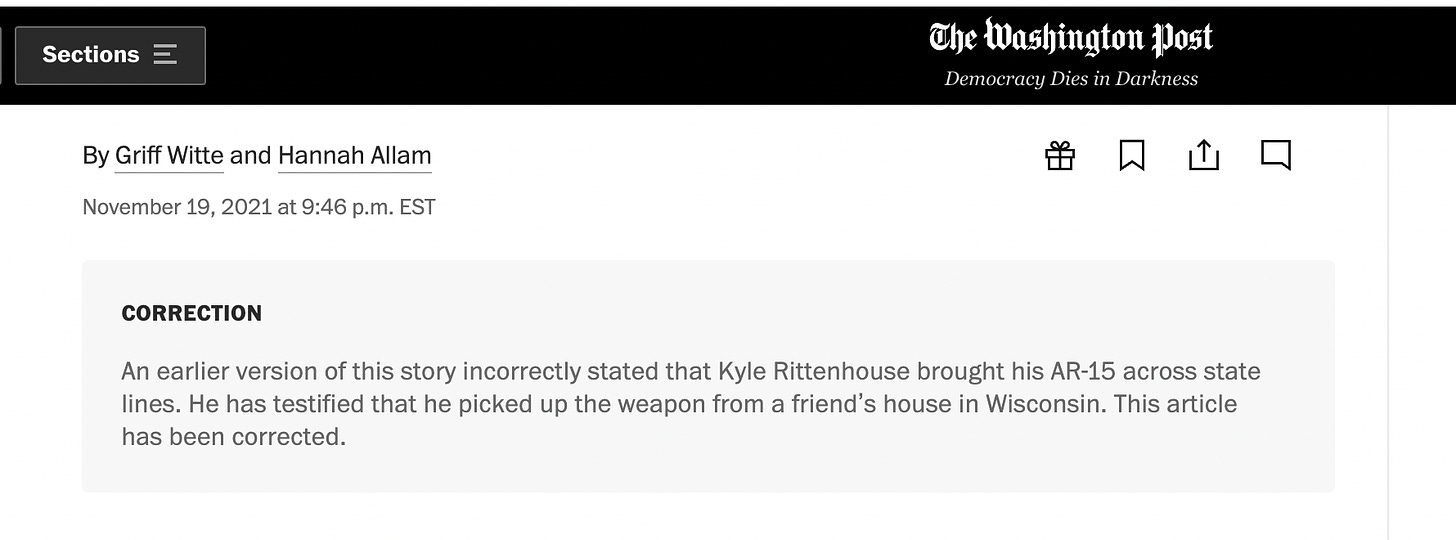
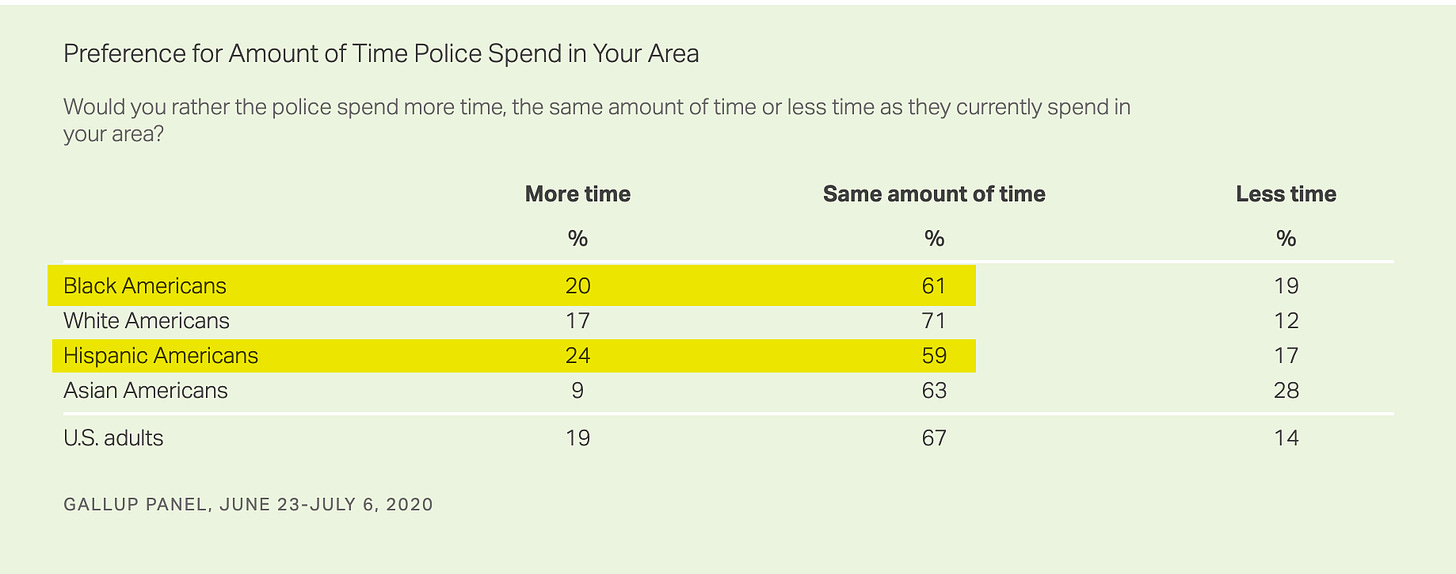
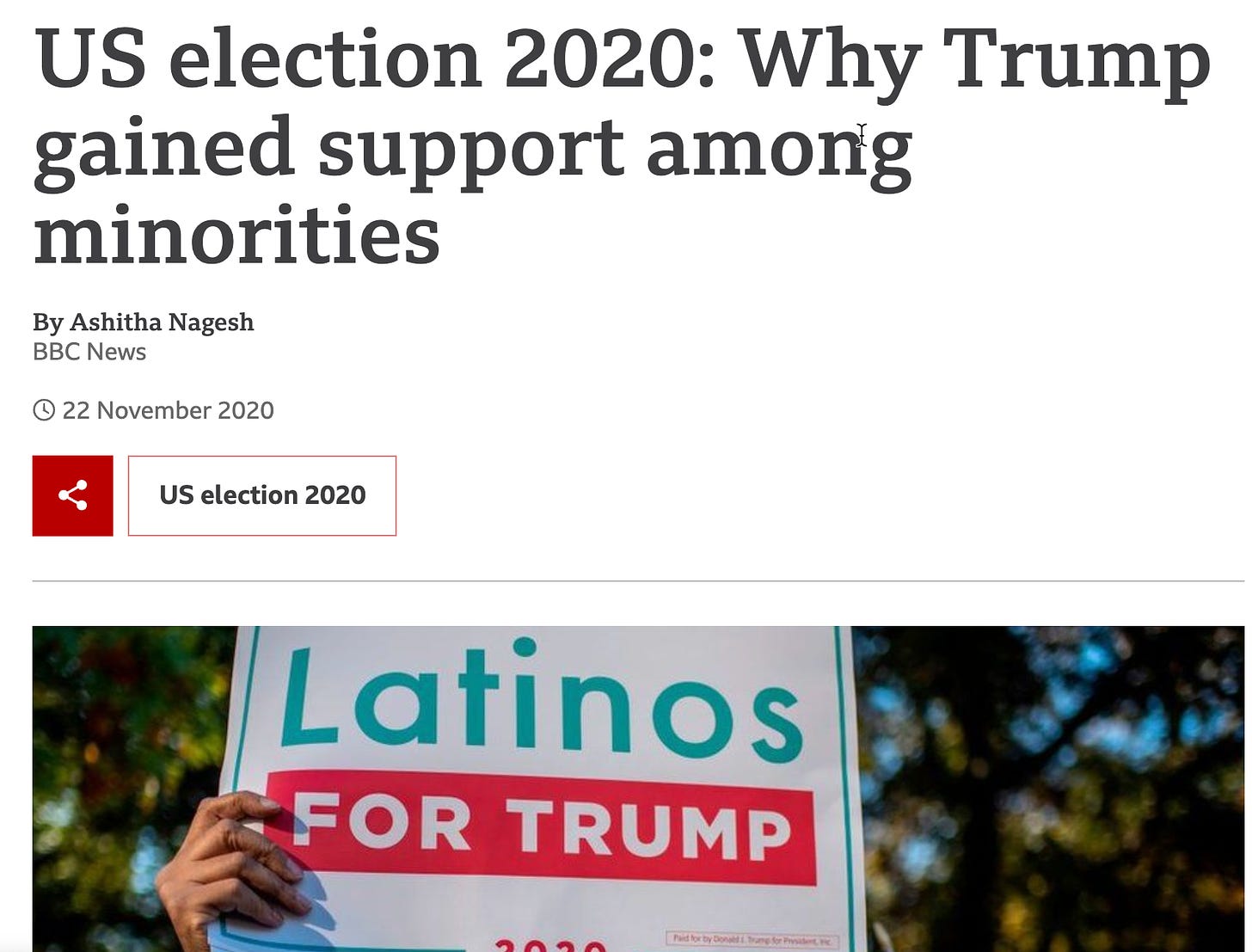
Comments
Post a Comment